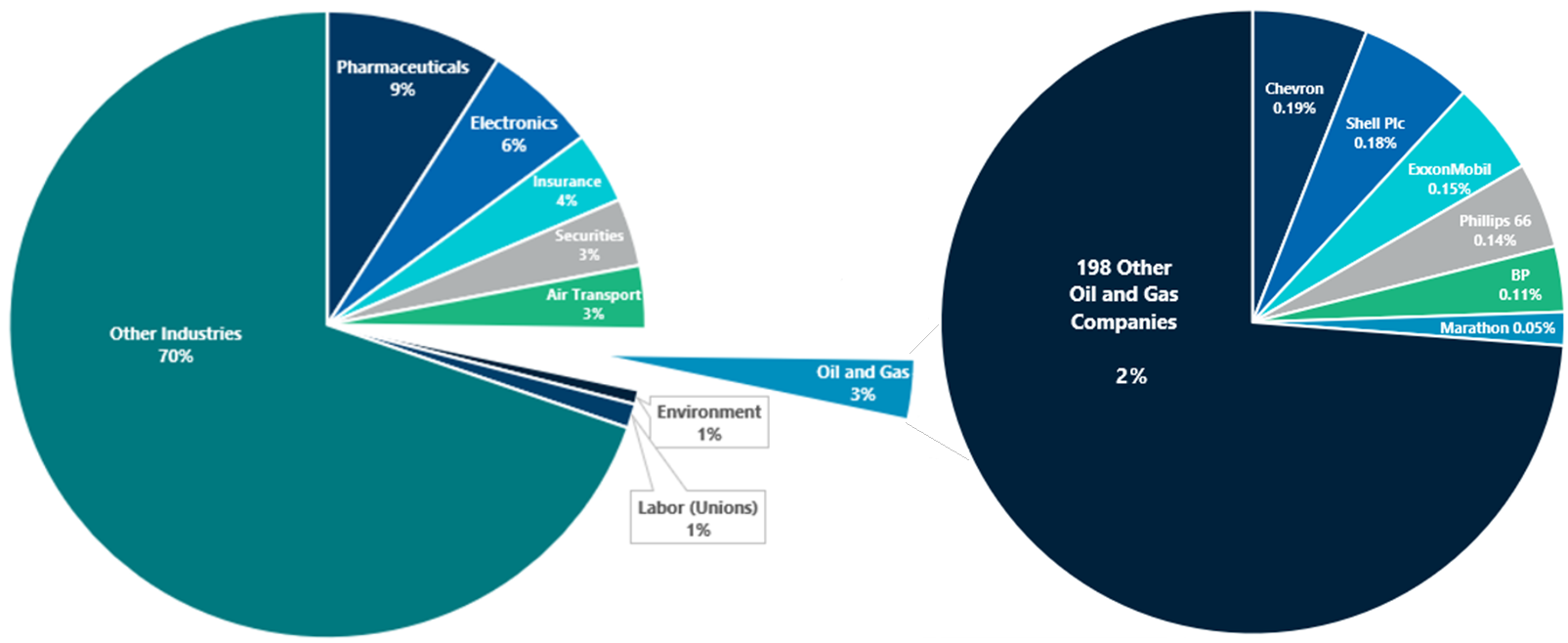5 min read
Introduction
5 min read
Navigate to:
Introduction
Lobbying in the United States is a well established part of the democratic process. Many groups, including businesses and nonprofits, use lobbying to voice their interests and perspectives. In 2023, the collective total spent by corporations and special interest groups on lobbying at the federal and state levels topped more than $5 billion, according to OpenSecrets1. ExxonMobil’s total spend on lobbying at the federal and state levels represents less than one quarter of 1% of that amount.
The role of lobbying in U.S. government
Lobbying is a legally protected right for groups to shape the public policy process. Many different groups, including companies, small businesses, and non-profits take part in lobbying. According to OpenSecrets, in recent years, more than 13,000 organizations have enlisted over 12,000 lobbyists to advocate for their interests in Washington, DC. These numbers do not include those who lobby at the state level.
A sizeable “industry”
Over the past several years, lobbying interests have grown steadily. Between 2017 and 2023, more than $37 billion was spent on federal and state lobbying in the United States.
Federal and state lobbying expenditures across all sectors, 2017-2023
In 2023, according to OpenSecrets, the following organizations spent the most on direct advocacy: the United States Chamber of Commerce, National Association of Realtors, American Hospital Association, Blue Cross/Blue Shield, and Pharmaceutical Research & Manufacturers of America (PhRMA). The top five corporate spenders on federal lobbying in 2023 were Amazon, Meta, Boeing, Alphabet and General Motors. These companies’ average spend was about $16.5 million, which is close to twice the $8.7 million average of the top five energy companies.
Oil and gas industry lobbying
A report issued in 2023 by the American Petroleum Institute (API) and data from OpenSecrets showed that, in 2021, the nation’s oil and gas industry accounted for only about $121 million of the nearly $4 billion spent on lobbying at the federal level. That same year, the oil and gas industry represented nearly $1.8 trillion, or more than 7%, of the total gross domestic product (GDP). As demonstrated by the graph, a variety of sectors engage in federal lobbying, with many outspending the oil and gas industry, and ExxonMobil, in 2023.
As demonstrated by the chart, other sectors significantly outspent the oil and gas industry on federal lobbying in 2023.
Federal lobbying expenditures by all industries, 2023

Percentages are rounded
Additional information related to oil and gas revenues and federal lobbying expenditures has also been provided in the chart below and is publicly available.
2023 Oil and gas federal lobbying expenditures represent small fraction of revenue
Organization |
Percent spent on federal lobbying |
2023 sales and other operating revenues |
2023 federal lobbying expenditure based on Lobbying Disclosure Act |
Phillips 66 |
0.0040% | $147,399,000,000 | $5,920,000 |
Chevron |
0.0040% | $196,913,000,000 | $7,950,000 |
Shell |
0.0025% | $316,620,000,000 | $7,850,000 |
BP |
0.0022% | $210,130,000,000 | $4,532,500** |
ExxonMobil |
0.0019% | $344,697,000,000 | $6,400,000* |
Marathon |
0.0016% | $148,379,000,000 | $2,300,000 |
Figure 3: Sources: Senate LDAs and SEC Filings
* Excludes Denbury as the acquisition did not close until November 2023. Denbury represents an additional $440,000 in lobbying expenditures in 2023.
** Includes TravelCenters of America as the acquisition closed in May 2023. TravelCenters of America represents $382,500 of this total.
Political giving
Political Action Committees (PACs) are groups established by corporations, trade associations, and membership organizations to raise funds from employees or members to support political candidates. Since their creation in the 1940s, PACs have become common in American politics. All PACs must register with the Federal Election Commission (FEC), which makes campaign finance data public.
Oil and gas companies account for a small fraction of PAC giving as compared to other sectors. For example, according to OpenSecrets, during the 2022 election cycle, labor PACs contributed more than $54,000,000 to candidates, while oil and gas PACs contributed only about $12,000,000. The chart below demonstrates how various industries contributed significantly more during the 2022 election cycle.
PAC Contributions by industry, 2022 election cycle
As with many corporations, ExxonMobil allows certain eligible employees and shareholders an opportunity to participate in the U.S. political process by contributing to a company-sponsored PAC. Participation in the PAC is completely voluntary. At the federal level, ExxonMobil has not used any funds, including treasury or political action committee funds, for direct independent political expenditures, including electioneering communications.
More information about ExxonMobil’s political contributions for the past several years is available here.
The Rise of Climate-Focused Super PACs
Super PACs were created after the Supreme Court ruled in Citizens United v. Federal Election Commission in 2010 to allow unlimited corporate and union spending in elections. While Super PACs cannot give money directly to federal candidates or parties, they can spend unlimited amounts to support or oppose a candidate.
There are no Super PACs dedicated specifically to energy security issues. Further, ExxonMobil is prohibited by law to use corporate treasury funds to support any federal candidates, national political parties or other political committees, including Super PACs.
By contrast, according to OpenSecrets data from the 2022 election cycle, the four largest Super PACs focused on environmental and climate issues – the League of Conservation Voters Victory Fund, Climate Power Action, NextGen Climate Action and the Environmental Defense Fund Action Votes – raised more than $87 million to support their agenda. Additionally, during the same election cycle, the four largest Super PACs focused on labor issues – National Education Association Advocacy Fund, Working for Working Americans PAC, Workers Vote and Law Enforcement for a Safer America – raised more than $92 million to support their agenda. This spending is more than three times that of ExxonMobil’s all-in lobbying and political spend of about $27 million in the 2022 cycle.
Transparency and Disclosures
While the oil and gas industry’s lobbying activities are closely watched, the sector is also known for being very transparent. As with this report, the industry often publishes reports on political engagement, discloses trade association memberships, and maintains websites publicly detailing their activities. Many of these companies, including ExxonMobil, go beyond all state and federal transparency requirements, making it easy for the public to see their political engagement. The following chart provides federal lobbying expenditures, the most recent and complete election cycle PAC contributions and links to voluntary disclosures for a sampling of organizations.
Sampling of corporate political expenditures and disclosures
Organization |
Percent of revenue spent on political expenditures |
2023 Federal lobby expenditure |
2023 PAC Contributions |
2023 sales and other operating revenues |
Voluntary Disclosure(s) |
Pfizer |
0.0265% | $14,360,000 | $1,123,106 | $58,496,000,000 | LINK |
Lockheed Martin |
0.0245% | $14,066,565 | $2,473,110 | $67,571,000,000 | LINK |
Boeing |
0.0220% | $14,490,000 | $2,599,140 | $77,794,000,000 | LINK |
Meta |
0.0144% | $19,300,000 | $161,295 | $134,902,000,000 | LINK |
Comcast |
0.0131% | $13,690,000 | $2,204,331 | $121,572,000,000 | LINK |
Alphabet (Google) |
0.0049% | $14,450,000 | $677,172 | $307,394,000,000 | LINK |
Chevron |
0.0043% | $7,950,000 | $426,022 | $196,913,000,000 | LINK |
Amazon |
0.0036% | $19,860,000 | $706,964 | $574,785,000,000 | LINK |
ExxonMobil |
0.0020% | $6,400,000* | $448,765 | $334,697,000,000 | LINK |
Figure 5: Source: The FEC and OpenSecrets
* Excludes Denbury as the acquisition did not close until November 2023. Denbury represents an additional $440,000 in lobbying expenditures in 2023.
FOOTNOTES:
1All data pulled from OpenSecrets as of 10.28.2024. OpenSecrets is a nonpartisan, independent and nonprofit organization, recognized as the nation’s premier research group tracking money in U.S. politics and its effect on elections and public policy.






